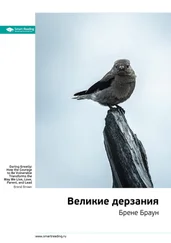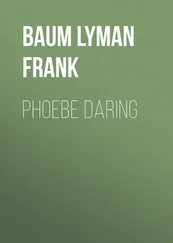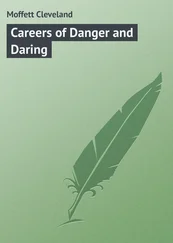Scarcity is the “never enough” problem. The word scarce is from the Old Norman French scars, meaning “restricted in quantity” (c. 1300). Scarcity thrives in a culture where everyone is hyperaware of lack. Everything from safety and love to money and resources feels restricted or lacking. We spend inordinate amounts of time calculating how much we have, want, and don’t have, and how much everyone else has, needs, and wants.
What makes this constant assessing and comparing so self-defeating is that we are often comparing our lives, our marriages, our families, and our communities to unattainable, media-driven visions of perfection, or we’re holding up our reality against our own fictional account of how great someone else has it. Nostalgia is also a dangerous form of comparison. Think about how often we compare ourselves and our lives to a memory that nostalgia has so completely edited that it never really existed: “Remember when … ? Those were the days …”
THE SOURCE OF SCARCITY
Scarcity doesn’t take hold in a culture overnight. But the feeling of scarcity does thrive in shame-prone cultures that are deeply steeped in comparison and fractured by disengagement. (By a shame-prone culture, I don’t mean that we’re ashamed of our collective identity, but that there are enough of us struggling with the issue of worthiness that it’s shaping the culture.)
Over the past decade, I’ve witnessed major shifts in the zeitgeist of our country. I’ve seen it in the data, and honestly, I’ve seen it in the faces of the people I meet, interview, and talk to. The world has never been an easy place, but the past decade has been traumatic for so many people that it’s made changes in our culture. From 9/11, multiple wars, and the recession, to catastrophic natural disasters and the increase in random violence and school shootings, we’ve survived and are surviving events that have torn at our sense of safety with such force that we’ve experienced them as trauma even if we weren’t directly involved. And when it comes to the staggering numbers of those now unemployed and underemployed, I think every single one of us has been directly affected or is close to someone who has been directly affected.
Worrying about scarcity is our culture’s version of post-traumatic stress. It happens when we’ve been through too much, and rather than coming together to heal (which requires vulnerability), we’re angry and scared and at each other’s throats. It’s not just the larger culture that’s suffering: I found the same dynamics playing out in family culture, work culture, school culture, and community culture. And they all share the same formula of shame, comparison, and disengagement. Scarcity bubbles up from these conditions and perpetuates them until a critical mass of people start making different choices and reshaping the smaller cultures they belong to.
One way to think about the three components of scarcity and how they influence culture is to reflect upon the following questions. As you’re reading the questions, it’s helpful to keep in mind any culture or social system that you’re a part of, whether your classroom, your family, your community, or maybe your work team:
Shame:Is fear of ridicule and belittling used to manage people and/or to keep people in line? Is self-worth tied to achievement, productivity, or compliance? Are blaming and finger-pointing norms? Are put-downs and name-calling rampant? What about favoritism? Is perfectionism an issue?
Comparison:Healthy competition can be beneficial, but is there constant overt or covert comparing and ranking? Has creativity been suffocated? Are people held to one narrow standard rather than acknowledged for their unique gifts and contributions? Is there an ideal way of being or one form of talent that is used as measurement of everyone else’s worth?
Disengagement:Are people afraid to take risks or try new things? Is it easier to stay quiet than to share stories, experiences, and ideas? Does it feel as if no one is really paying attention or listening? Is everyone struggling to be seen and heard?
When I look at these questions and think about our larger culture, the media, and the social-economic-political landscape, my answers are YES, YES, and YES!
When I think about my family in the context of these questions, I know that these are the exact issues that my husband, Steve, and I work to overcome every single day. I use the word overcome because to grow a relationship or raise a family or create an organizational culture or run a school or nurture a faith community, all in a way that is fundamentally opposite to the cultural norms driven by scarcity, it takes awareness, commitment, and work … every single day. The larger culture is always applying pressure, and unless we’re willing to push back and fight for what we believe in, the default becomes a state of scarcity. We’re called to “dare greatly” every time we make choices that challenge the social climate of scarcity.
The counterapproach to living in scarcity is not about abundance. In fact, I think abundance and scarcity are two sides of the same coin. The opposite of “never enough” isn’t abundance or “more than you could ever imagine.” The opposite of scarcity is enough, or what I call Wholeheartedness. As I explained in the Introduction, there are many tenets of Wholeheartedness, but at its very core is vulnerability and worthiness: facing uncertainty, exposure, and emotional risks, and knowing that I am enough.
If you go back to the three sets of questions about scarcity that I just posed and ask yourself if you’d be willing to be vulnerable or to dare greatly in any setting defined by these values, the answer for most of us is a resounding no. If you ask yourself if these are conditions conducive to cultivating worthiness, the answer is again no. The greatest casualties of a scarcity culture are our willingness to own our vulnerabilities and our ability to engage with the world from a place of worthiness.
After doing this work for the past twelve years and watching scarcity ride roughshod over our families, organizations, and communities, I’d say the one thing we have in common is that we’re sick of feeling afraid. We all want to be brave. We want to dare greatly. We’re tired of the national conversation centering on “What should we fear?” and “Who should we blame?”
In the next chapter we’ll talk about the vulnerability myths that fuel scarcity and how courage starts with showing up and letting ourselves be seen.
Chapter 2
Debunking the Vulnerability Myths
Yes, we are totally exposed when we are vulnerable. Yes, we are in the torture chamber that we call uncertainty. And, yes, we’re taking a huge emotional risk when we allow ourselves to be vulnerable. But there’s no equation where taking risks, braving uncertainty, and opening ourselves up to emotional exposure equals weakness.
MYTH #1: “VULNERABILITY IS WEAKNESS.”
The perception that vulnerability is weakness is the most widely accepted myth about vulnerability and the most dangerous. When we spend our lives pushing away and protecting ourselves from feeling vulnerable or from being perceived as too emotional, we feel contempt when others are less capable or willing to mask feelings, suck it up, and soldier on. We’ve come to the point where, rather than respecting and appreciating the courage and daring behind vulnerability, we let our fear and discomfort become judgment and criticism.
Vulnerability isn’t good or bad: It’s not what we call a dark emotion, nor is it always a light, positive experience. Vulnerability is the core of all emotions and feelings. To feel is to be vulnerable. To believe vulnerability is weakness is to believe that feeling is weakness. To foreclose on our emotional life out of a fear that the costs will be too high is to walk away from the very thing that gives purpose and meaning to living.
Читать дальше
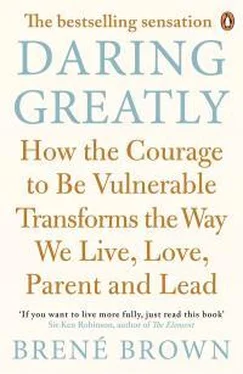


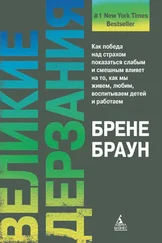

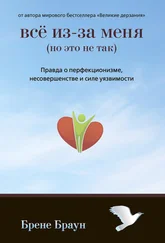
![Брене Браун - Вопреки. Как оставаться собой, когда всё против тебя [litres]](/books/436389/brene-braun-vopreki-kak-ostavatsya-soboj-kogda-v-thumb.webp)
